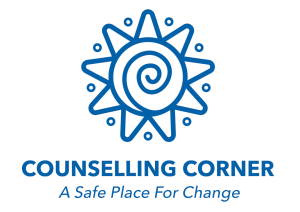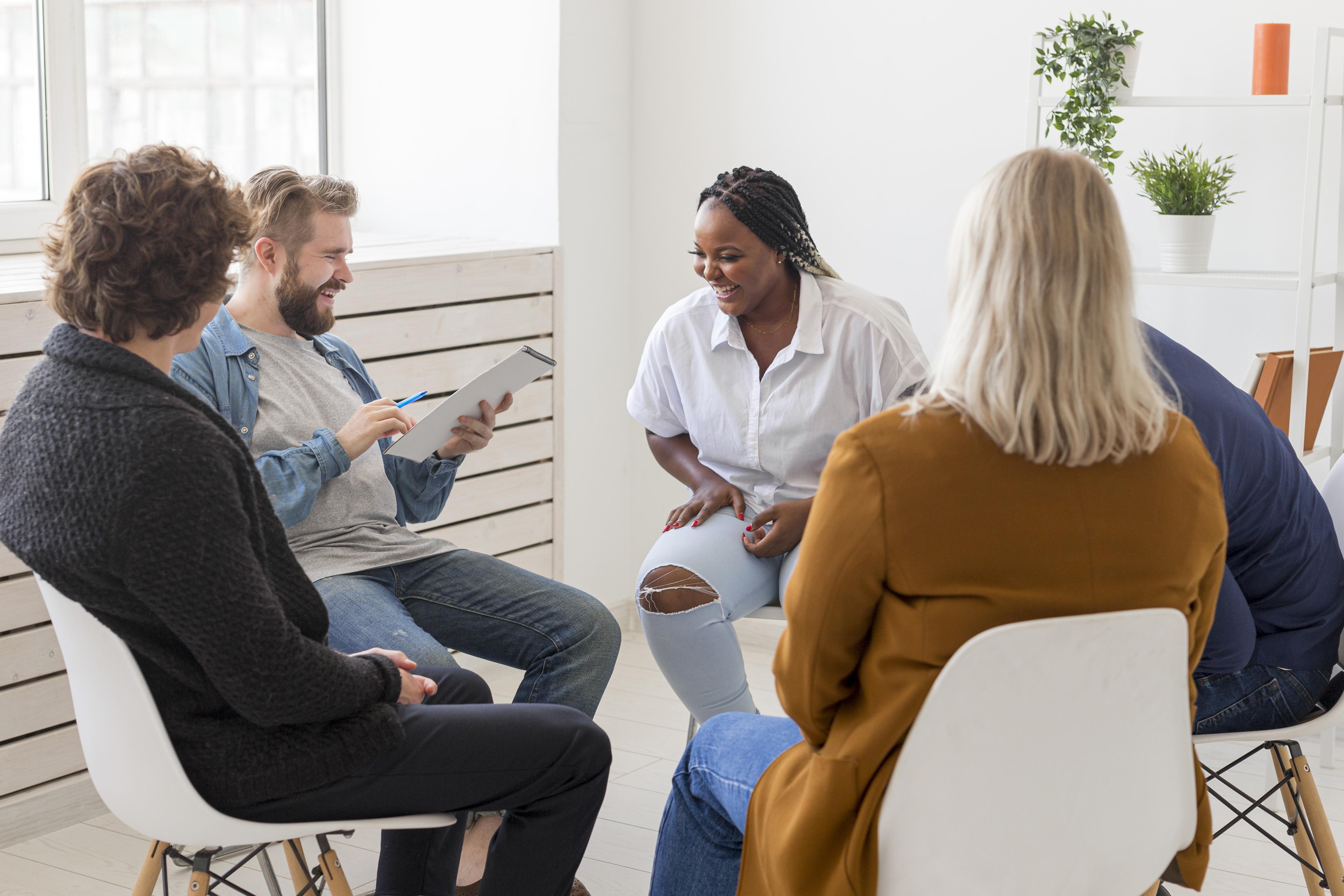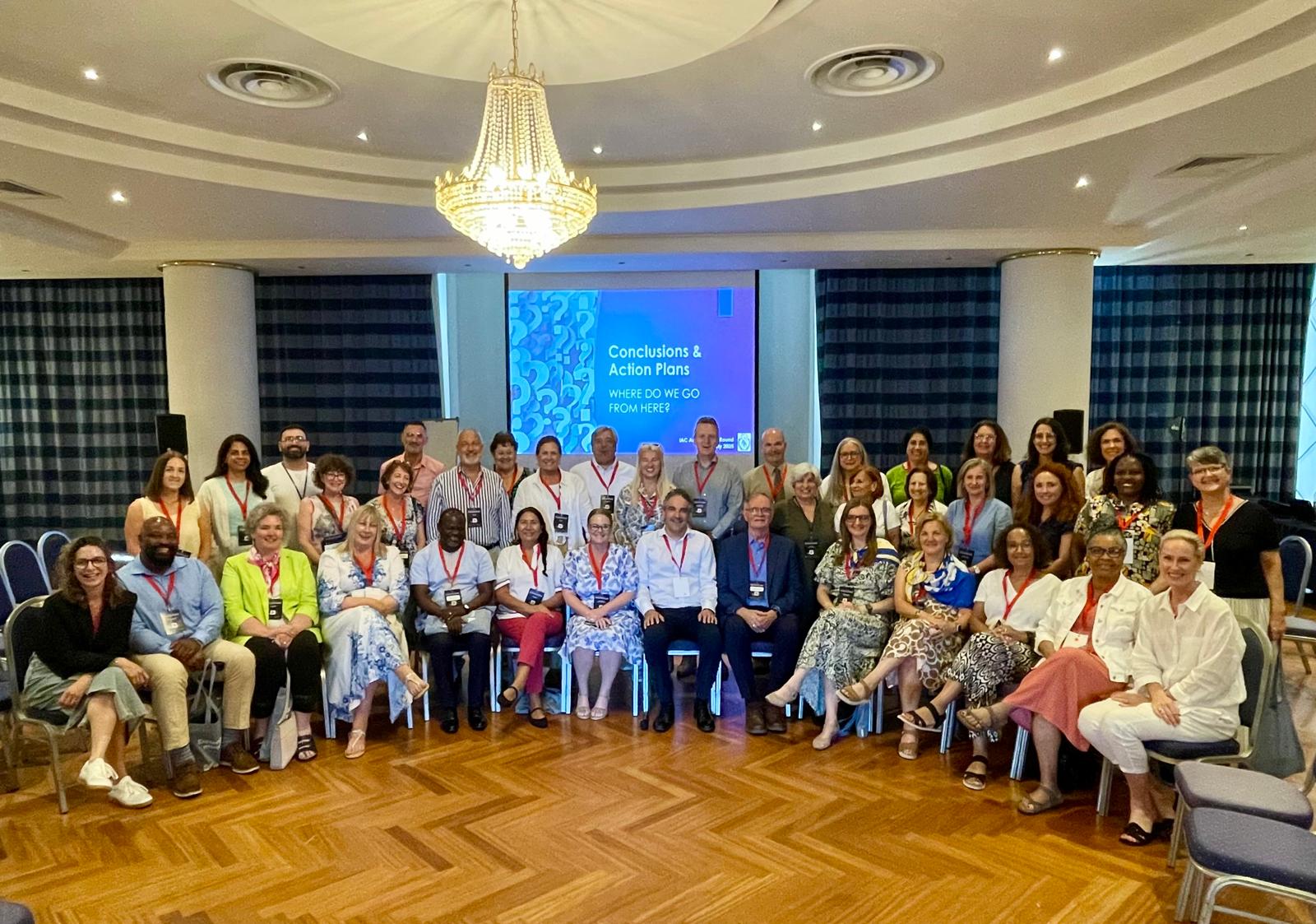-
Dear Members,
The ballot opened on Wednesday, 11 February 2026 and will close on Wednesday, 18 February 2026 at 11:00 am EST (USA).
All positions are uncontested. Nominee biographies are available here: https://www.iac-irtac.org/?q=node/314Each individual IAC member is permitted one vote. Votes cast by IAC organisational members are weighted in accordance with the Constitution.
Thank you for your participation!
The IAC Elections Committee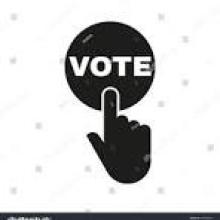 10/02/2026
10/02/2026 -
Counselling Corner - Changing the mental health landscape in Myanmar
In Myanmar, a country in SE Asia with about 54 million population, mental health has long been a landscape of silence.
- Talking about feelings was considered shameful.
- Counselling did not exist as a profession.
- Universities offered no training, and few clinics recognized mental health.
Decades of conflict, displacement, poverty, and natural disasters have created widespread trauma, yet access to professional counselling is almost non-existent.
From a one-person office in 2018, Counselling Corner Myanmar has grown into Myanmar’s first counselling movement supporting over 3,500 people every month in workshops and individual counselling sessions with over 100 staff. Focusing on person-centred therapy in a country where mental health was considered taboo.
In 2022, the Seit Mate Swe program was launched (which means “Mental Friend” in Burmese), which is our community-based model:
- Safe spaces for counselling in refugee camps, villages, and cities
- Trauma healing for children through play, art, and storytelling
- Young counsellors from conflict zones becoming healers for their own communities
This program is currently running 25 community mental health centres across the country, working with a voucher system. This model ensures that communities receive care at no cost and counsellors are fairly compensated for their work, so that mental health becomes accessible and sustainable, even in the most vulnerable areas.
Find out more about our newest member in their most recent newsletter.
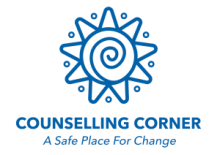 12/11/2025
12/11/2025 -
We are delighted to share that IAC is one of four partners in a newly funded Erasmus+ KA210-VET project: Developing Basic Training Principles in the Counselling Profession. The project has been awarded a total European Union grant of €60,000, running from 1 September 2025 to 28 February 2027.
This important initiative builds on ongoing international efforts to establish shared training guidelines that support professional competencies, ethical standards, and the wider recognition of counselling. The successful consortium brings together IAC-Europe association partners from Malta (MACP — lead partner), Ireland (IACP), Italy (AssoCounseling), and IAC/IAC-Europe, uniting diverse expertise and perspectives.
Work will begin shortly, and we look forward to the ways this project will advance counselling practice and recognition not only across Europe, but also in the wider global community.
 10/09/2025
10/09/2025 -
IAC, in collaboration with the University of Malta and the Malta Association for the Counselling Profession, proudly hosted its 2025 Annual Conference, 11–13 July, in Malta, drawing hundreds of counselling professionals, scholars, and mental health leaders from across the globe. Held under the theme “Counselling in a World of New Challenges: Cultivating Mental Health and Wellbeing,” the conference was a milestone event for the global counselling profession.
Counsellors from over 40 countries gathered in Malta to engage in three transformative days of learning, networking, and advocacy. The dynamic programme featured over 70 powerful presentations, cutting-edge sessions, and main-stage presentations tackling the most pressing issues in mental health today — including climate-informed counselling, digital wellness, trauma care, cultural humility, resilience, and more.
Historic Launches
Several initiaves launched during the conference, including the official establishment of IAC Europe, IAC's first fully established regional branch; the Malta Declaration, developed by IAC in collaboration with the British Association for Counselling and Psychotherapy (BACP) and the Canadian Counselling and Psychotherapy Association (CCPA) to addresses the growing mental health impacts of climate change; and World Health Organization and the United Nations Children's Fund (WHO–UNICEF) Foundational Helping Skills Training Manual.
Looking Ahead
The 2026 IAC Conference will take place in Uruguay, co-hosted by the Asociación Uruguaya de Counselors. Stay tuned for details.
Thank You to our Sponsors
Special thanks to the IAC 2025 Conference sponsors: The European Board for Certified Counselors (EBCC), The National Board for Certified Counselors (NBCC), The American Counseling Association (ACA), Chrysalis Courses, Malta Tourism Authority, the Government of Malta, and Medina Asset Management.
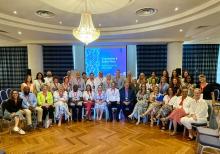 05/08/2025
05/08/2025 -
The Malta Declaration, developed by IAC in collaboration with the British Association for Counselling and Psychotherapy (BACP) and the Canadian Counselling and Psychotherapy Association (CCPA), was launched on Friday, 11 July, 2025, at the IAC Annual Conference. Named for the country where it launched, the declaration calls on counsellors and mental health organizations worldwide to respond to the growing mental health impacts of climate change.
As climate-related anxiety, trauma, and displacement intensify, counsellors have a vital role in promoting emotional resilience, culturally sensitive care, and sustainable solutions. The Declaration outlines key commitments to:
✅ Recognize the mental health consequences of climate change
✅ Equip counsellors with climate-informed tools and training
✅ Address global and local inequalities in mental health access
✅ Support practitioner well-being and self-care
✅ Advocate for climate action at all levels
✅ Foster international collaboration and knowledge-sharingThis global statement is informed by a comprehensive survey of counselling organizations across continents and is aligned with the goals of the World Health Organization (WHO), UNESCO, UNICEF, WMO, and other UN agencies.
Join the Movement
Counselling organizations, professionals, and allied groups are invited to endorse and implement the Malta Declaration to help build a more resilient, equitable, and mentally healthy world in the face of climate change. 04/08/2025
04/08/2025 -
June 11, 2025
Dear Colleagues and Friends,
A warm welcome to this Annual General Meeting of the International Association for Counselling. It’s a pleasure to be with you, and to reflect on the progress we’ve made together over the past year.
Let me begin by sincerely thanking the members of the Executive Council. Your leadership, care, and commitment during a time of rapid and often unpredictable global change have kept IAC steady, innovative, and ever more relevant. To each of our Officers, and to our Regional Representatives from every corner of the globe, thank you. Your perspectives and voices help ensure that IAC remains truly international in vision and action.
Officers
Nate Peron, Secretary
Ruth Falzon, Interim Treasurer
Lisa Isenman, IAC Communications Chair
Dione Mifsud, IAC Past President
Members
Sue Mohnani, IAC Europe Regional Representative
Desiree Carlson, IAC Latin American Regional Representative from Mexico
Matthew Lyons, IAC North American Regional Representative from USA
Anna Maria Mora, IAC Caribbean Regional Representative from Trinidad and Tobago
Dominic Actionman Nsona, IAC African Regional Representative from Malawi
Tommaso Valleri, IAC Executive Member at large from Italy
Vacancies
Regional Representative (Asia)
Regional Representative (Middle-East)
Regional Representative (Oceania)
Member at large
I also would like to note that CEO Naoise Kelly is the only IAC member who works full time on behalf of IAC. Naoise brings a passion, energy, and knowledge to everything he does and is a pleasure to work with. With every task or issue he addresses he is innovative, precise, and detailed, and he responds quickly, professionally, and efficiently. Naoise, thank you for all of your excellent work in advancing the aims and activities of IAC.
We are growing in scope, scale, and substance.
Our regional development is accelerating. Our current focus is on Africa, the Caribbean, and Europe. Around the world our representatives are building stronger connections between national counselling associations. These regional networks are not just symbolic; they are shaping policy, agreeing on standards for education and practice, driving innovation, and building solidarity in the profession.
Europe in particular has shown what’s possible when counsellors organize regionally. The new IAC-Europe Branch is finalizing its structure and will be launched at the conference in Malta next month. This excellent model can be replicated in other regions—with adjustments for cultural context and national needs.
As we grow regionally, we also grow in purpose.
We are sharpening our identity as the world body and an association of associations—a truly international platform for collaboration, knowledge sharing, and coordinated action. Like other global professions in nursing, social work, and psychology, we are working on establishing IAC as a policy and practice hub that national organizations can rely on, learn from, and contribute to.
We’ve undertaken updates to our Constitution and Byelaws—ensuring that our governance matches our mission. These changes give regions a stronger voice and clearer mechanisms for cooperation. Our structure is now designed to support the scale of activities we are building—and the scale we aim for.
In our work, we are not just expanding—IAC is deepening.
We are collaborating across continents on some of the most pressing issues in our field. Our partnership on Climate-Responsive Counselling, working with the British Association for Counselling and Psychotherapy and the Canadian Counselling and Psychotherapy Association, is developing policy, training, and research that address climate anxiety, ecological grief, and resilience-building. All of you will be invited to be signatories to that milestone document.
Similarly, we’re responding to the ethical and psychological implications of artificial intelligence. How will AI shape therapeutic relationships? How can we protect human dignity, confidentiality, and empathy in the age of algorithms? These are not abstract questions—they are practical ones that our members are encountering now. We are convening experts and counsellors from around the world to explore, guide, and shape the field responsibly.
We’re also working with the American Mental Health Counselors Association to produce Global Guidelines for Remote Counselling. As distance therapy becomes a permanent and vital part of the counselling landscape, our goal is to ensure ethical, effective, and culturally relevant practice across every region and digital platform.
If there are other issues that you think we should focus on, please put them in the chat.
Meanwhile, the World Mapping of the Counselling Profession project continues to document the diverse forms of counselling worldwide—highlighting innovations, traditions, and gaps. This work informs our advocacy and supports governments and associations seeking to develop counselling infrastructures in their own contexts.
Our foundation is strong—and our vision is clear.
We are here because we believe in a world where counselling is available to all. Our mission—to serve as a catalyst for culturally relevant practice, research, and policy—is more relevant than ever in today’s fast-moving, interdependent world.
We’ve articulated our core values clearly: respect, integrity, excellence, service, commitment, and collaboration. These are not just words; they are the daily guideposts for our work with associations, institutions, and individuals alike.
So what comes next?
We are moving toward more interconnected research, more cross-regional training, and more platforms for peer collaboration. We want to support national associations not just with solidarity, but with real resources, tools, and pathways to influence public policy. We are exploring ways to engage youth and early-career professionals globally, because the future of the profession depends on their leadership, innovation, and sense of possibility.
On behalf of the counselling profession, we are reinforcing our partnerships with organizations like the World Health Organization and other United Nations agencies with whom we have consultative status.
We have two specific events in the near future that reflect who we are and how we would like to move forward:
Once the changes to the constitution are approved, in the coming days we will be sending out a timeline for the upcoming election for members of the Executive Council. This is first IAC election to be held on line and will provide all members of the association the opportunity to vote.
Our annual conference will be held in Malta, 11-13 July. This will be an outstanding event and I would like to thank the University of Malta, the Malta Association for the Counselling Profession for partnering with us in offering what promises to be an outstanding event. I also would like to thank everyone involved in the massive amount of work that is required in preparing the conference. Naoise will provide some highlights in the CEO report.
In closing, the world is changing—fast, and counselling activity is growing exponentially. Counselling has a vital role to play in helping people make sense of that change, care for each other, and find purpose and peace in the midst of complexity. IAC wants to help individuals, groups, and communities to build a future that is inclusive, resilient and enduring.
Thank you for being part of it.
With appreciation,
Professor Bill Borgen
President
International Association for Counselling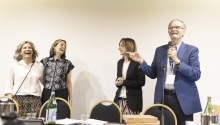 17/06/2025
17/06/2025 -
IAC President Dr. Bill Borgen (3rd from right) presented at the UNESCO NGO HUB in Paris in December 2024.
Event Overview
The 2024 International Conference of NGOs, held at UNESCO Headquarters from 17-19 December 2024, focused on "Building Capacity for Action." It gathered global stakeholders to discuss UNESCO’s priorities, enhance capacity building, and foster collaboration between NGOs and UNESCO's program sectors.
Day 1
Tuesday, 17 December 2024: The conference began with opening remarks from key figures, including UNESCO Deputy Director-General Xing Qu and H.E. Ambassador Simona-Mirela Miculescu. The session included an overview of UNESCO’s Programme and Budget for 2026-2029, presented by Zazie Schafer. Discussions focused on Priority Africa, with experts like Mohamed Elfarnawany highlighting capacity-building challenges and opportunities across the continent. A session on Successes, Challenges, and Lessons Learned explored collective action between NGOs, UNESCO sectors, and national commissions. Afternoon parallel sessions delved into specific topics, including Education for Peace, Human Rights, and Youth Engagement, facilitating direct dialogue between NGOs and UNESCO's sector leaders.
Day 2
Wednesday, 18 December 2024: Day 2 featured a plenary on Gender Equality, discussing issues like technology-facilitated gender-based violence, led by experts such as Begoña Lasagabaster. Other key moments included the launch of the Manual for NGO Participation in the Ocean Decade, and sector dialogues on Culture and Social and Human Sciences, with a focus on initiatives like MONDIACULT 2025 and the legacy of the Transatlantic Slave Trade. In the afternoon, NGOs contributed to the refinement of UNESCO's budget proposals for 2026-2029, followed by a workshop on multi stakeholder approaches to fostering change within institutions.
Day 3
Thursday, 19 December 2024: The final day featured a session on Building Partnerships, with Dumitru Drumea and others discussing NGO collaboration with UNESCO. It also included the presentation of the Activity and Financial Reports of the NGO-UNESCO Liaison Committee. The NGO Hub allowed civil society to share experiences, fostering networking and future collaboration. Dr. Bill Borgen, President of IAC, provided an overview of the association’s aims and activities and invited collaboration with other NGO’s with similar interests. The conference concluded with the approval of NGO Recommendations for UNESCO’s upcoming budget and program, followed by a closing session with outgoing and newly-elected Chairpersons.
Conclusion
The 2024 conference successfully brought together diverse stakeholders to discuss key issues like education, gender equality, and cultural preservation, fostering stronger partnerships and refining proposals for UNESCO's 2026-2029 priorities.
IAC and UNESCO's Education Sector
The International Association for Counselling (IAC) engaged in a productive meeting with Astrid Gillet, Chief of the Executive Office of UNESCO’s Education Sector, and her colleagues to explore potential collaboration opportunities. During the meeting, IAC expressed a strong interest in supporting UNESCO’s mental health support in Education, career guidance initiatives (particularly those related to the BEAR Project), UNESCO's work in crisis conditions, and its regional frameworks in Africa and Europe. IAC will follow UNESCO’s upcoming Global Career’s Month in 2025 with interest, recognizing it as a valuable opportunity for future cooperation. IAC IAC President, Dr. Bill Borgen, IAC CEO, Naoise Kelly, and IAC Consultant Dr. Roberta Borgen were particularly encouraged by the alignment between IAC’s work and UNESCO’s educational priorities under the leadership of Stefania Giannini, Assistant Director-General for Education at UNESCO. This initial conversation has laid the groundwork for further exploration of synergies between the two organizations to advance shared goals in education and social inclusion.
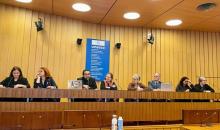 21/02/2025
21/02/2025 -
The IAC Europe regional branch is making significant progress toward its official establishment in early 2025. Key associations and working groups have been meeting regularly, collaborating to achieve this important goal. The governance document, the result of a full year of dedicated work, is being finalized and will soon set the stage for formal recognition, marking a major milestone in the group’s journey. IAC Europe is led by regional representative Suzanne Mohnani, a counselor, counseling supervisor, educator, and Malta Adlerian Psychology Association treasurer.
The IAC Europe Standards Working Group has made excellent progress, and the work of the Advocacy Group has been instrumental in its initiatives. Recently, the group showcased its efforts at the Naples conference, marking another important step in the mission to establish IAC Europe. IAC Europe’s goal is to strengthen professional unity and foster a shared identity within the counselling profession. The collective impact of a unified profession is far greater than the sum of its individual parts. IAC Europe extends an invitation to associations and countries not currently participating to join them. For further details or to express your interest, please contact the IAC Europe Committee at iaceuropecommittee@gmail.com.
IAC's regional structure, which provides inclusivity and representation at a regional level, comprises IAC Africa, IAC Asia-Pacific, IAC-Carribean, IAC Europe, IAC Latin America, IAC Middle East and Central Asia, IAC North America, and IAC-Oceania. The purpose of the IAC Regional Branches is to advocacate for the legal recognition of counselling, set region-wide counselling standards, support national counselling associations, and to support region-specific education, research and practice programmes. Learn more about establishing an IAC regional branch.
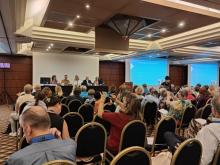 14/12/2024
14/12/2024 -
The IAC Africa regional group met online on 10 December, 2024, with 25 attendees from around the continent, including representatives from Botswana, Cameroon, Malawi, South Africa, Uganda, and Zimbabwe. Facilitated by IAC Africa regional represenative Dominic Nsona, a practicing counselor and president of the Malawi Association for Counselling, the meeting included membership and conference updates, a discussion of the main challenges faced by counsellors in Africa, and initiatives for action and advocacy. The next meeting 4 February, 2025. Please contact Dominic Nsona if you would like to join.
IAC's regional structure, which provides inclusivity and representation at a regional level, comprises IAC Africa, IAC Asia-Pacific, IAC-Carribean, IAC Europe, IAC Latin America, IAC Middle East and Central Asia, IAC North America, and IAC-Oceania. The purpose of the IAC Regional Branches is to advocacate for the legal recognition of counselling, set region-wide counselling standards, support national counselling associations, and to support region-specific education, research and practice programmes. Learn more about establishing an IAC regional branch.
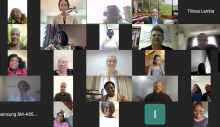 13/12/2024
13/12/2024 -
IAC CEO Naoise Kelly with WHO Director-General Dr. Tedros Adhanom Ghebreyesus
As the global representative body for the counselling profession and an international non-governmental organization with United Nations consultative status, IAC was invited to participate in three days of high-level meetings at the World Health Organization 8-10 October, 2024. IAC is representing its international community of counsellors at two key events:
Event 1: Meeting of Non-State Actors (NSAs) in Official Relations with WHO working on Mental, Neurological, and Substance Use (MNS) Conditions (8 October) Attending this meeting presents valuable opportunities for IAC to expand its global influence and advance its mission. Specifically, IAC is focused on:- Strengthening its partnership with the WHO and Non-State Actors (NSAs).
- Advocating for the essential role of counselling within the global health agenda.
- Aligning IAC's initiatives with WHO’s strategic priorities in Mental, Neurological, and Substance Use (MNS) conditions, ensuring that IAC’s contributions effectively support global health objectives in mental health.
- Addressing collaboration challenges to create more effective and impactful partnerships.
Event 2: WHO Mental Health Forum 2024 (9 & 10 October) “Global Mental Health in Motion: Looking Back, Looking Forward”
This forum, convened by WHO, is a crucial gathering focused on advancing the global mental and brain health agenda. It began with strategic remarks from WHO leaders, including Tedros Adhanom Ghebreyesus and Dévora Kestel. The event centers on addressing Mental, Neurological, and Substance Use (MNS) conditions, which remain a significant global health burden. Its purpose is to enhance collaboration between WHO, Member States, and NSAs, sharing best practices and aligning efforts with WHO’s strategic goals in mental health care, neurological health, and substance use treatment.Attendees include representatives from over 80 countries, alongside major global organizations such as the Red Cross, UNICEF, the World Bank, and leading academic institutions, emphasizing the importance of global representation. The forum covers critical mental health issues, including mental health in emergencies, neurodiversity, youth suicide prevention, and new policy guidelines.A key moment of the forum is the launch of The Lancet Psychiatry Commission on mental health in Ukraine, adding urgency to the discussions surrounding mental health in crisis situations. Breakout sessions and presentations dive deep into regional mental health initiatives, fostering a collaborative and action-oriented atmosphere. The closing plenary reinforces attendees' commitment to advocacy and global cooperation, emphasizing the pivotal role of international partnerships in addressing mental health challenges and improving outcomes worldwide.The Global Mental Health Forum, coinciding with World Mental Health Day, is a cornerstone event for uniting global efforts to ensure mental health, neurological care, and substance use prevention are prioritized on the global health agenda. (details here).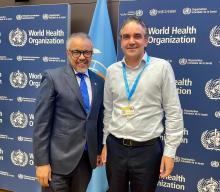 09/10/2024
09/10/2024
- 1 of 8
- next ›


